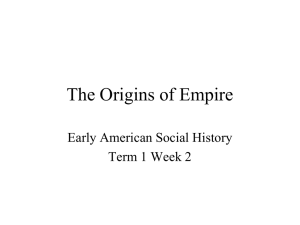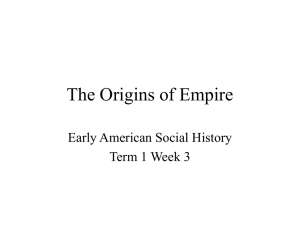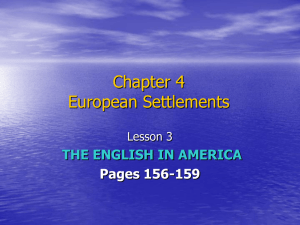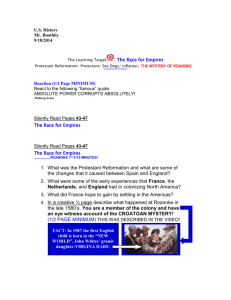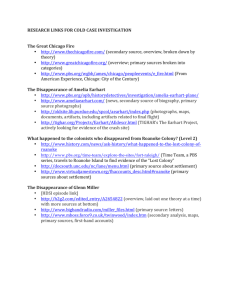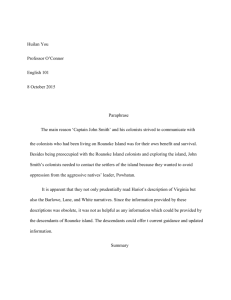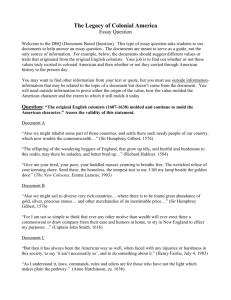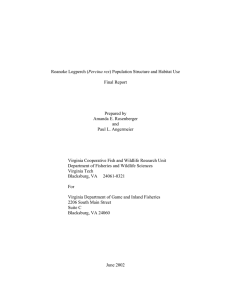Power Point Week 2
advertisement
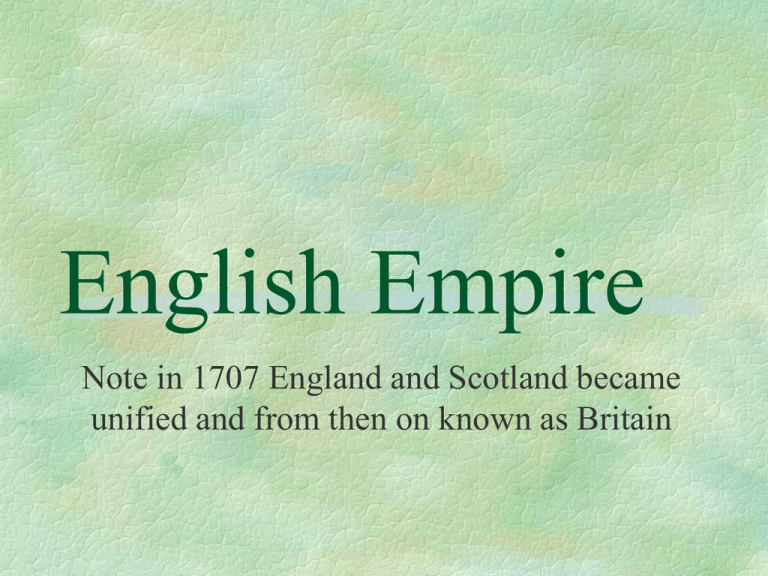
English Empire Note in 1707 England and Scotland became unified and from then on known as Britain Reading and discussion prep A. If there is a book assigned for the week I will expect you to use that to prepare B. If there is not I will post some a extract online (usually primary source) I also expect you to give yourself a background knowledge of the subject Role of England England weak, politically and economically in comparison to Spain. Henry VII had sponsored John Cabot’s voyages to Canada 1497, lost interest when NW passage not discovered. Lack of political will, and military capacity to challenge Spain before later 16thC But- dry run for colonial expansion in Ireland Ireland Ireland conquered by Normans, but gradually England lost control. Tudors show renewed interest. Major military expeditions during Elizabethan period, led by soldiers & adventurers. Followed up by colonizers, especially those seeking large land holdings, use of Gaelic Irish as serfs, frequent atrocities and brutality towards Irish seen as Catholic, barbaric, sub-humans. About 200,000 migrants from GB to Ireland 1600-1670, twice number who went to America Ireland as a blueprint Financed by Joint Stock Companies, same as would finance American colonies Use of promotional literature to popularize colonization Attitudes towards native peoples similar Many of the individuals involved in Irish colonization later involved in American colonization e.g. Richard Grenville, Humphrey Gilbert, Walter Raleigh. English Imperial Ambitions Motivation: envy of Spanish treasure from America; wealth helped Spain become most powerful nation; English policy to break the Iberian monopoly on America due to fear that American wealth, after Henry VIII's split with Rome (1534), could be used against them. English government sanctioned privateering operations against Spanish. Capturing Spanish treasure ships bringing gold & silver from New World. By 1580 increasingly dangerous to prey on Spanish shipping suggestion that American base needed. Idea that American colonies would also ease English reliance on southern Europe for citrus fruits, silks, and vines. Importance of Propaganda, Richard Haklyut. 1st patent to settle in America granted to Sir Humphrey Gilbert, half brother to Walter Raleigh, permitted him to settle anywhere between Florida and Northern Canada Early British Attempts Initially England was not successful Martin Frobsier Searching for gold and a northwest passge 3 failed journeys between 1576-1578 Humphrey Gilbert Attempted to settle in Newfoundland – failed, Gilbert dies at sea John Hawkins and Francis Drake Successful in the Caribbean But as pirates not settlers But by 1580 England still had no permanent settlement in Americas Three English voyages to settle North America in 1580s. Roanoke The first landed at Roanoke Island, North Carolina on July 13th, 1584, short lived military expedition which found that the land was suitable for both cultivation and defence, returned home to England with 2 local Indians, Manteo & Wanchese. Roanoke Island 1585-6, 2nd English Voyage under Ralph Lane, discovered Chesapeake Bay, ideal as naval base. Noted for the oil paintings of John White and the descriptions of Thomas Hariot. But, young male adventurers, with ambitions of land and wealth, not ideal colonists. Indian relations deteriorated, food supply from Indians cut off Drake arrived summer 1586, seeking re-supply, ends up providing food for colonists, eventually agrees to return them to England The Lost Colony Third voyage 1587: very different from previous ones most colonists farmers not soldiers, & came in family groups. Clearly intended to be a permanent settlement, self-sustaining and self-reproducing. John White = Governor, returned to England for more supplies, leaving daughter and grand-daughter, Virginia Dare, at Roanoke. Unable to return until 1590 due to Spanish Armada, since all ships diverted to defence of realm. When finally arrives, found settlement abandoned, colonists never seen again. Most likely attacked by Indians, survivors absorbed into tribes. Importance of Roanoke 3 voyages saw evolution of colonising thought Roanoke seen as A base for privateering, Then a place where valuable raw materials could be shipped to England, Third voyage aimed to settle permanently. The lessons of Roanoke were clear: no colony could exist without full support from mother country for at least the first few years of existence; clear goals were needed good relations with the Indians were necessary Put this together and what was needed was Order Order would give control and allow for a structure Although beginning of cracks in strict hierarchy Still a rigid concept Heading to the unknown there was a need to reinforce it Two examples of understanding of English order All things bright and beautiful, All creatures great and small, All things wise and wonderful: The Lord God made them all. Each little flower that opens, Each little bird that sings, He made their glowing colors, He made their tiny wings. The rich man in his castle, The poor man at his gate, He made them, high or lowly, And ordered their estate. Into this steps John Smith Born 1580 in England left home at age 16 after his father died Began travels France fighting for Dutch independence from Spain. Two years later, Mediterranean Sea, working on a merchant ship 1600 joined Austrian forces to fight the Turks promoted to Captain while fighting in Hungary This is the moment were Smith fights and defeats 3 Turkish champions Transylvania 1602 wounded in battle, captured, and sold as a slave to a Turk. Turk sent Smith as a gift to his sweetheart in Istanbul Girl fell in love with him sent him to brother to get training for Turkish imperial service. Escaped by murdering the brother Returned to Transylvania through Russia and Poland Released from service Received large reward Traveled Europe and Northern Africa Returned to England in the winter of 1604-05.
